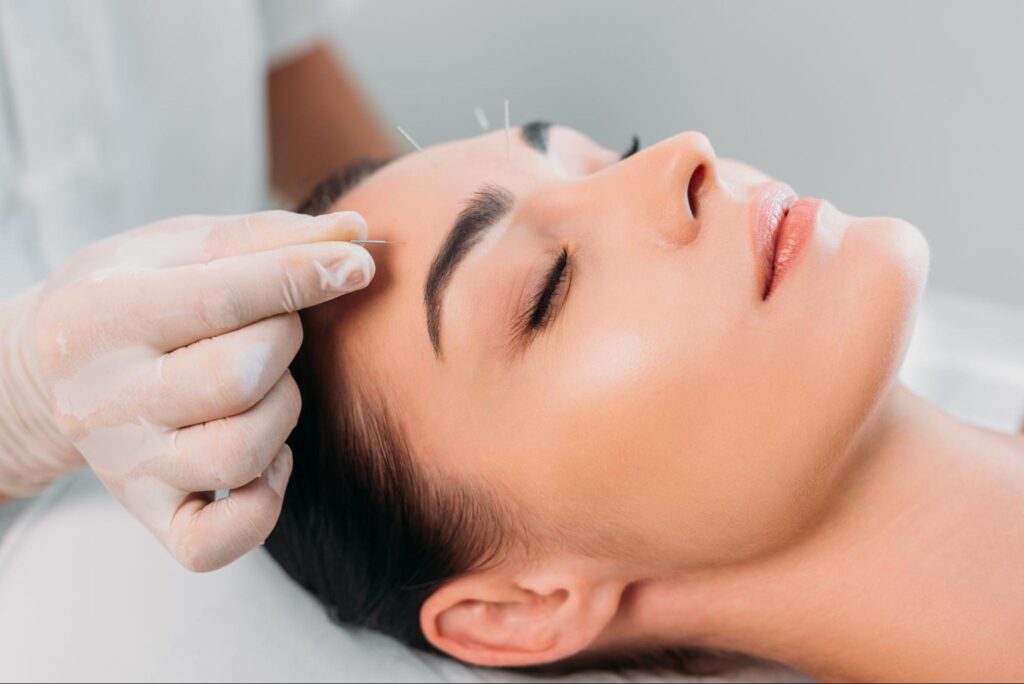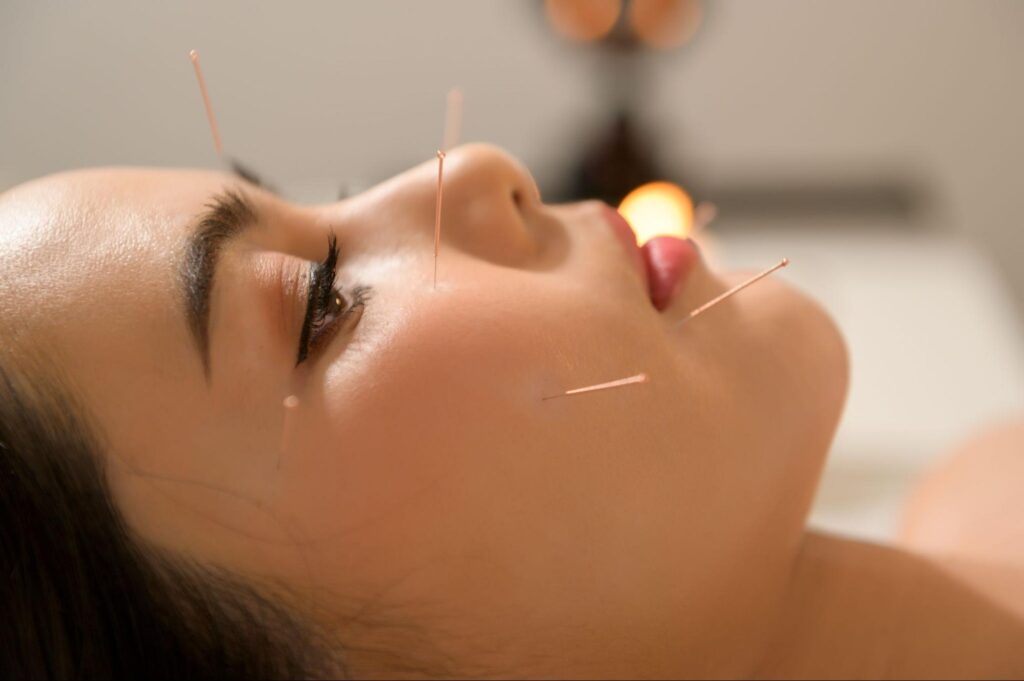
Acupuncture, an ancient Traditional Chinese Medicine (TCM) practice, has become increasingly popular in Western cultures. Its therapeutic benefits are now recognized not only for pain relief but also for enhancing overall well-being. This holistic approach involves inserting fine needles into specific points on the body to stimulate energy flow. While it was once seen as an alternative treatment, acupuncture is now integrated into modern healthcare and wellness routines. For those looking to improve their health and performance, acupuncture offers a unique range of benefits.
1. Acupuncture for Stress Relief in Daily Operations
Stress is a constant companion in our fast-paced lives. Acupuncture provides a natural solution for managing stress, reducing anxiety, and promoting relaxation. By regulating cortisol levels—the body’s primary stress hormone—acupuncture helps calm the nervous system. That leads to improved focus, better decision-making, and a more balanced approach to daily operations. Whether managing your business or dealing with daily tasks, reducing stress with acupuncture can enhance your overall mental health and productivity.
2. Acupuncture Enhances Mental Clarity and Focus
Clear thinking is essential in every aspect of life. Acupuncture helps improve mental clarity by stimulating the body’s natural energy flow, or qi. By targeting specific points related to cognitive function, acupuncture enhances focus and reduces mental fatigue. As a result, individuals experience sharper concentration and improved memory. Whether making important decisions at work or managing daily responsibilities, this heightened mental clarity can help you stay sharp and focused.
3. Acupuncture Improves Sleep Quality
A good night’s sleep is critical for maintaining health, yet many suffer from insomnia or disrupted sleep. Acupuncture offers a natural solution to improve sleep quality by addressing imbalances in the body’s energy flow. When the body’s energy pathways are balanced, falling asleep and staying asleep become easier. It leads to more restful and restorative sleep, promoting better mental clarity, energy, and productivity during the day. Regular acupuncture sessions can be a game-changer for those struggling with sleep issues.
4. Acupuncture Supports Pain Management
Chronic pain is a widespread problem, and many people seek noninvasive ways to manage it. Acupuncture is an effective treatment for various types of pain, including back pain, migraines, and arthritis. By stimulating the release of endorphins—your body’s natural painkillers—acupuncture targets specific areas of discomfort and reduces pain levels. For individuals dealing with persistent pain, acupuncture offers a pathway to relief that doesn’t rely on medication. It can significantly improve physical comfort and overall quality of life.
5. Acupuncture for Digestive Health
Digestive issues can be disruptive and uncomfortable, affecting overall energy and well-being. Acupuncture can help regulate digestion by addressing imbalances in the stomach and intestines. It has been proven effective in treating conditions such as irritable bowel syndrome (IBS), bloating, and indigestion. By improving the digestive process, acupuncture helps individuals maintain better energy and overall vitality. When digestion functions optimally, you can focus better, feel more energized, and maintain a healthier lifestyle.
6. Acupuncture Boosts Immune System
A well-functioning immune system is essential for staying healthy and avoiding frequent illnesses. Acupuncture supports the immune system by balancing the body’s energy flow and promoting overall health. When the body’s energy is aligned, its ability to fight infections and illness strengthens. Acupuncture also helps reduce inflammation and improve circulation, which is vital to maintaining a robust immune system. Regular treatments can lead to fewer colds and infections, contributing to a healthier, more balanced life.
7. Acupuncture Supports Emotional Balance
Maintaining emotional balance is crucial for overall well-being. Acupuncture can help regulate emotions by targeting areas of the body linked to mood, stress, and anxiety. Many individuals use acupuncture to manage symptoms of depression and anxiety, finding relief in its ability to promote relaxation and emotional stability. This emotional balance can improve relationships, increase self-awareness, and foster a greater sense of well-being in daily life. Whether facing personal challenges or work-related stress, acupuncture helps restore a sense of calm and emotional clarity.
8. Acupuncture Increases Energy Levels
Fatigue is a common complaint, especially in our busy, high-demand world. Acupuncture can restore energy by balancing the body’s qi or life force. By stimulating specific energy points, acupuncture helps reduce feelings of fatigue and boosts vitality. When energy flows freely through the body, individuals feel more alert, refreshed, and capable of tackling daily challenges. Whether you’re dealing with mid-day slumps or chronic fatigue, acupuncture can provide a natural energy boost without the need for stimulants.
9. Acupuncture Supports Respiratory Health
Breathing is essential to life, yet many people suffer from respiratory issues like asthma, allergies, or chronic congestion. Acupuncture can help alleviate these conditions by improving lung function and promoting better airflow. By targeting specific points in the body, acupuncture reduces inflammation in the respiratory system, helping to clear nasal passages and improve breathing. This improvement in respiratory health allows for more effective physical activity, clearer thinking, and an overall increase in comfort during daily life.
10. Acupuncture Promotes Cardiovascular Health
Cardiovascular health is vital to long-term well-being, and acupuncture supports heart health in various ways. It can help regulate blood pressure, improve circulation, and reduce stress—three factors contributing to cardiovascular wellness. By enhancing the body’s natural ability to maintain healthy blood flow, acupuncture can reduce the risk of heart disease and promote overall heart health. Incorporating acupuncture into your wellness routine can help maintain cardiovascular health and support a longer, healthier life.
Types of Acupuncture Techniques
Acupuncture has evolved into various techniques designed to address specific health concerns. While the traditional method of needle insertion is the most well-known, several other approaches have been developed to enhance or adapt acupuncture’s effectiveness. Here are some of the most common types of acupuncture techniques:
Traditional Needle Acupuncture
Traditional acupuncture involves inserting thin, sterile needles into specific points on the body to stimulate energy flow, or “qi.” This method targets energy pathways, known as meridians, and treats various conditions, including pain, stress, and chronic illnesses. The needles are typically left in place for 15 to 30 minutes, allowing the body’s energy to balance and promote healing.
Electroacupuncture
Electroacupuncture is a modern adaptation that combines traditional acupuncture with mild electrical currents. After the needles are inserted, a device generates small pulses of electricity to the needles, amplifying the treatment’s effects. This technique treats chronic pain, muscle spasms, and neurological conditions. It enhances stimulation of the acupuncture points, which may increase effectiveness in some instances.
Auricular Acupuncture
Auricular acupuncture focuses on the ear, a micro-system representing the entire body. Tiny needles or acupressure beads are applied to specific points on the ear that correspond to different organs and bodily systems. This technique addresses issues such as addiction, stress, and pain management. It is trendy in addiction recovery programs as a complementary treatment.
Acupressure
Acupressure is an alternative to acupuncture that does not use needles. Instead, practitioners apply manual pressure to acupuncture points using their fingers, palms, or special tools. Acupressure stimulates the same energy points used in traditional acupuncture, making it a popular option for individuals uncomfortable with needles. This technique is often used for self-care at home to relieve headaches, tension, and minor aches.
Cupping Therapy
While not strictly acupuncture, cupping is often used in conjunction with acupuncture treatments. In cupping therapy, small glass or silicone cups are placed on the skin and suctioned to create a vacuum effect. This helps stimulate blood flow, reduce muscle tension, and promote healing. Cupping is good for back pain, muscle stiffness, and respiratory conditions like asthma or bronchitis.
Moxibustion
Moxibustion is an ancient technique that involves burning a herb called “moxa” (usually made from dried mugwort) near acupuncture points. The heat generated from moxa stimulates energy flow and can improve blood circulation. Traditional Chinese medicine is particularly useful for conditions involving cold or stagnant energy, such as arthritis or digestive issues. This technique is often combined with acupuncture to enhance its therapeutic effects.
Laser Acupuncture
Laser acupuncture is a needle-free option in which low-level laser beams stimulate acupuncture points. This technique is especially beneficial for people who are sensitive to needles or want a less invasive experience. It’s commonly used in pain management and wound healing and can be effective for children and adults.
Scalp Acupuncture
Scalp acupuncture focuses on the head and is primarily used for neurological and brain-related conditions, such as stroke recovery, multiple sclerosis, and traumatic brain injuries. Very fine needles are inserted into specific scalp regions, stimulating areas linked to the brain’s functions. This technique is known for its potential to improve motor skills and cognitive function.
Abdominal Acupuncture
This method involves placing needles in specific points around the abdomen to treat internal organ issues and digestive problems. Abdominal acupuncture is based on the idea that the body’s core regulates energy flow to various body parts. It’s often used to address digestive disorders, menstrual issues, and chronic pain.
Fire Needle Acupuncture
Fire needle acupuncture involves quickly inserting a needle heated in a flame into acupuncture points. The heat provides additional stimulation to the end, enhancing its effect. This method treats conditions associated with cold or dampness, such as arthritis, or stimulates the immune system.
Acupuncture As a Key Component in Holistic Care
Acupuncture is more than a treatment for specific ailments—it’s a holistic approach that addresses the body, mind, and spirit. By balancing energy flow and supporting the body’s natural healing processes, acupuncture can profoundly enhance overall well-being. Whether you’re seeking relief from chronic pain, looking to reduce stress, or hoping to improve your mental clarity and emotional health, acupuncture provides a comprehensive, natural solution.
Incorporating acupuncture into your wellness routine offers a pathway to better health. It treats symptoms and addresses the underlying imbalances that contribute to various conditions. It bridges the gap between physical health and emotional resilience, making it integral to holistic care. Acupuncture is an investment in immediate relief and long-term wellness and balance.
Learn more about how acupuncture can transform your health by visiting the 간송한의원123 Acupuncture & Herbs blog.




